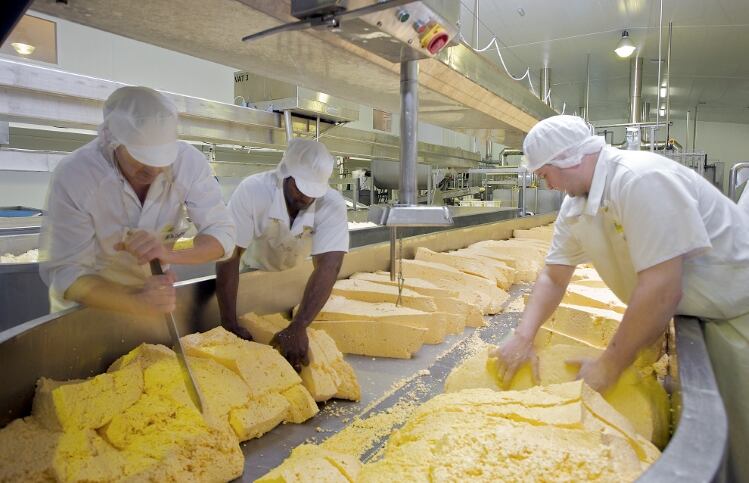Three years on from its launch, the government-funded and industry-led initiative, helping SMEs drive growth and decarbonize through digitalization, has now supported its 200th business. The program has invested £4.6m ($6.1m) over those three years.
Among the latest wave of manufacturers starting their journey to use technology to benefit their business, their bottom line and the environment are: English Lakes Ice Cream in Kendal; Firstplay Dietary Foods, a protein product maker in Stockport; and Mantle Packaging Machinery, a food packaging machinery manufacturer in Clitheroe.
Meanwhile, The Protein Lab (UK), a manufacturer of protein powders and supplements in Blackpool, is taking the next step in its digitalization journey.
Kendal Nutricare, based in Kendal, a manufacturer of nutrition products including infant formulas and baby cereals, used Made Smarter's digital internship program to prove the business case for employing a data analyst to harness the value of the data being produced in its factory, both in terms of the machinery, processes, and energy consumption.
Grant Remington, projects and contracts manager, said, "The internship through Made Smarter was a roaring success. He analyzed our site data highlighting areas to improve. Made Smarter then supported us to invest in a data and systems project for a new ERP system to control the site, monitor stock levels and give the business an enriched way to forecast, which we have started to implicate.”
Dewlay Cheesemakers, based in Garstang, invested in a new ERP (enterprise resource planning) system to manage the full end-to-end factory process including purchasing, sales, bill of materials, production scheduling, as well as introduced touchscreens and mobile scanners to manage the flow and usage of stock throughout the factory.
Ben Ardern, financial controller, said, “This has allowed us to greatly improve our traceability of products, as well as having up to date production information and more accurate stock. The data captured also allows the business to better see factory efficiencies and yields. The funding from Made Smarter allowed the business to look at a wider range of product offerings and choose the system that was the best fit for the business. Without this, and the uncertainty that the pandemic brought, the business may not have taken the plunge to make such a wide impacting change.”
Technologies that integrate systems, capture and analyse data, or create simulations of their plants and processes, are being used to drive efficiencies and reduce waste. Meanwhile, 3D-printing, automation, and robotics are being used to solve business challenges and meet increased demand.
These investments are forecasting the creation of 1,177 new jobs and 2,205 upskilled roles, and are forecast to deliver an additional £192.9m in gross value added (GVA) for the North West economy over the next three years.
Juergen Maier CBE, co-chair of Made Smarter, said, "We launched Made Smarter in the North West three years ago with the ambitious aim to kick start an adoption program for digital technologies among small and medium-sized enterprises, strengthened by leadership training and harnessing talent within universities.
“It is fantastic to see the tremendous impact that the program continues to have on individuals, businesses, the UK economy, and the environment.
“It is clear from the unequivocal success we are seeing in the North West, and the positive effect adoption programs in the West Midlands, Yorkshire and Humber, and the North East, are having that we are starting to grasp the multitude of opportunities that innovation and digital technologies offer. It is clear that for the UK manufacturing sector to thrive and become a world leader, we now need to roll out Made Smarter nationwide and with a stronger ambition.”
Since launching in 2018, Made Smarter has engaged with 1,381 businesses to help them introduce digital tools and technologies to help boost productivity and growth, navigate Covid-19, and tackle climate change.
To date, 670 have utilized the support, including expert, impartial technology advice, 248 have used digital transformation workshops to help take their first steps to transform their business, and 56 business leaders have developed the skills to pursue smarter manufacturing through the Made Smarter Leadership program, developed in partnership with Lancaster University. Meanwhile, manufacturers have benefited from funded digital technology internships, which offer students and graduates paid placements to work on live technology projects.
More than 80% of SMEs working with Made Smarter to adopt cutting-edge technologies have seen a boost in productivity, while others have benefited from increase in revenue and exports, job creation and providing new skills to workforces, as well as improved visibility and enhanced integration with supply chains. More than 25% reduced their carbon emissions, while others cut energy bills, reduced waste, and became more environmentally sustainable.

